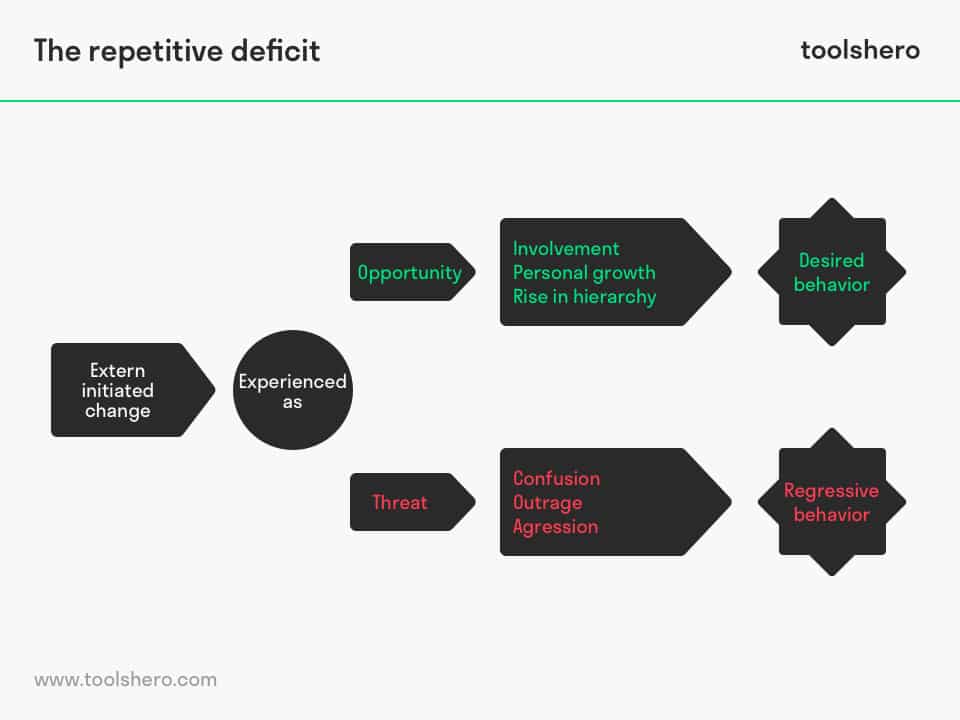Repetitive Deficit

Repetitive Deficit: this article explains the theory of Repetitive Deficit in a practical way. After reading you will understand the basics of this powerful change management tool.
What is Repetitive Deficit
Processes in changing organisations are very similar despite of the differences in branches. This occurring phenomenon is called the Repetitive Deficit. The experience stems from such different branches as career services, quality assurance in higher education, library branch, arts education, government, weeklies and assurance.
Repetitive Deficit in practice
Employees, in this situation mostly highly educated professionals, have to change behaviour in connection with the new order.
Some do not bother. The new behaviour is easily produced on behalf of their understanding and convinced of the new situation and their will to be a part of it. They are energized and are reviving. They proclaim to understand that they are not mad after all, in order to point out their frustration in the old days.
Others on the other hand fall back to old standards and cannot internalise the new ones. They work hard, get entangled and do wrong. Of course we do confront them, stimulate them and give them time and opportunities. But when it does not work out there is this inevitable moment of take one’s leave.
In this situation we assume the employee is good willing, was highly rewarded in the former days, and – to a certain extend – tried to show new behaviour.
Nevertheless it is not enough. In words of drama: the repertoire is not there. Nowadays we know from psychology that not everyone is able to learn certain tasks and we that stress provokes regressive behaviour.
The manager experiences that the employee does not understand, is filled with indignation, and gets angry on you. Do not blame yourself, the employee is projecting his deficit on you, before you arrived everything was all right! He was highly appreciated. Since this outsider came in everything is changed. And mind you: this is all correct…isn’t it?
If he really understood the new course, if he really embraced it by mind and by heart, than his behaviour would have changed. Now this isn’t the case he regresses to old standards and idealizes the behaviour that complies with them. Moreover he points out his former contributions and the years he contributed to the organisation (as if effort is more accountable than result).
His deficit hinders him to behave in the new way and is the obstruction to see that the time to leave has come, that he is the owner of the deficit, that his convictions are based on self defence, and that he’s better off in another situation where his competences are paying etc. etc..
In the end it is the same deficit that – in these following phases – obstructs him. That’s why I called it the repetitive deficit. The employee will understand that his decision is about to be made.
Possible approaches
There are two possible approaches to turn the situation around:
The collective approach
Hire an highly valued outsider that – in an intensive setting of two days –elaborates the principles behind the new business model with the professionals. In his words cause your words are worn out.
At the end they make a presentation for you. There were some beautiful results to report with this approach.
The individual approach
Let an confidential agent have an consult were the future and the happiness of the professional are the focus.
It’s Your Turn
What do you think? Do you recognize the practical explanation about Repetitive Deficit or do you have any additions? What are your success factors for a organizational culture change?
Share your experience and knowledge in the comments box below.
How to cite this article:
Kok, J. (2015). Repetitive Deficit. Retrieved [insert date] from toolshero: https://www.toolshero.com/change-management/repetitive-deficit/
Add a link to this page on your website:
<a href=”https://www.toolshero.com/change-management/repetitive-deficit/”>toolshero: Repetitive Deficit</a>
Published on: 01/04/2015 | Last update: 18/02/2022













